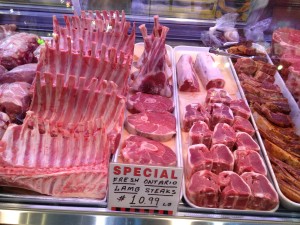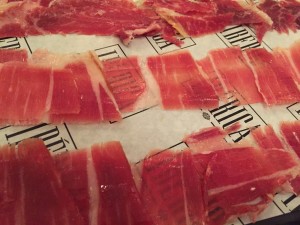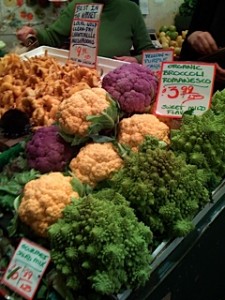Red Meat and Bacon: Making Sense of the Madness
My vegan friends are saying “finally – we knew meat was bad for you, here have a twig!” My friends who love bacon are sitting in silent mourning hoping there is some mistake or ‘over reach’ with the latest recommendation from the World Health Organization. Why? Because if you haven’t heard, the WHO is classifying ‘processed meats’ as carcinogenic, and red meat as ‘probably’ carcinogenic.
What many are saying is that “everything we eat causes cancer.”
The Definitions:
 Red meat is defined as beef, veal, pork, lamb, mutton, goat, or horsemeat. (Yes, that includes your basic hamburger.)
Red meat is defined as beef, veal, pork, lamb, mutton, goat, or horsemeat. (Yes, that includes your basic hamburger.)
This does not include fish or chicken.
 Processed meat is any meat that is preserved with salting, curing, fermenting, or smoking – bacon, hot dogs, sausages, and my beloved blood pudding.
Processed meat is any meat that is preserved with salting, curing, fermenting, or smoking – bacon, hot dogs, sausages, and my beloved blood pudding.
Their studies did not include smoked salmon (whew).
What’s the risk?
The latest 1-page report is a summary by the World Health Organization to classify red meat and processed meats has created a storm of news with headlines like “bacon as bad as cigarettes.” (It isn’t, by the way, it isn’t anywhere near as bad as cigarettes.)
If you are 50 years old and eat 2 slices of bacon (about 50 grams) per day then your risk of developing colorectal cancer increases from 0.68 per cent to 0.8 per cent in the next ten years. Or, another way of looking at it – most people have a 5% risk of getting colon cancer in their lifetimes, and by eating the bacon you increase it to 6%. Would you change your habits to reduce cancer risk by 1 per cent (this is where vegetarians feel smug – although some wrongly believe their vegetables make them exempt from cancer).
This is not new information; this has been in the public sphere for years.
With processed meat there has been a small, but consistent, correlation between colorectal cancer and consumption. This isn’t surprising. Think of how processed meat is preserved. The smoke used to cure the meat is not healthy, nor are the vats of nitrates. Not all processing comes from caustic materials – salt cured meat is given the same classification as smoked meats, or meats cured in nitrates. The studies have never made that distinction.
The studies that showed the cancer correlation were from large population studies, where the incidence of colon cancer was increased among those who ate processed meat.
You will read how some will state that the evidence in these studies is weak. That there is many other factors that can be responsible for this increase besides bacon. For example, some red meat eaters have a higher consumption of alcohol, which is a promoter of cancer. Or, that many of these studies are based on dietary recall – which is flawed from the outset.
The association with processed meats and cancer isn’t zero or negative. The association is real, it has been seen in multiple studies, and reproduced over several. This was a part of the more than 800 studies that were examined by the WHO. What cannot be denied is that the risk is moderated by many other factors (maybe diet, maybe your gut bacteria, maybe your own genes).
What is the MECHANISM of cancer and bacon?
We don’t know. In spite of speculation about how meat is cooked, how it is kept, how it is processed, there is not a single mechanism or a model for how cancer is caused by processing meat or consuming red meat. Scientists can not make cancer by giving rats lots of bacon.
But a model is not necessary. There is not a model for lung cancer and cigarettes in animals. On the other hand the evidence – the statistical data for smoking and lung cancer is so high that one is not needed.
Perspective: relative risk of smoking and lung cancer is 20, relative risk of eating two slices of bacon daily and colon cancer is 1.2 – a relative risk of 1 means there is no correlation.
To cause cancer, we have to change the DNA. The classic model of cancer is from radiation that causes cancer by mutation of the DNA. We have a cause, a method, and we can reproduce it. We can irradiate bacteria and see them change their DNA, or parts of mice. We see radiation damage to skin cells (from the sun) and people who live near radiation sources have high risks of developing cancer.
Proposed Mechanisms for cancer and bacon
The proposed mechanism for developing cancer from red and processed meats comes down to damage to the gut. One group of compounds the N-nitroso group (NOC’s) damage the lining of the gut – and there are more NOCs in processed meats, which form these at a high rate.
The other is the mechanism by which the meat is heated. That lovely char on meat called the Maillard Reaction produces heterocyclic amines (HCAs) that are associated with cancer. Ironically, all meats (the white meat such as poultry, or fish) can have these – but red meat produces higher levels of HCAs. The “blackened” rubs while producing flavor do not cause the same levels of HCAs.
Iron is a necessary micronutrient for blood formation and red meat is a great source of dietary iron (red meat is red because of the iron). Too much iron can damage the lining of the gut when it oxidizes. Think of red meat as a nail that becomes rusty. That rusty oxidation is what causes cell damage.
With every suspect, there are a few “red herrings.” You probably heard about TMAO, which is a compound linked to atherosclerotic heart disease and colon cancer. This is a compound found a lot in fish. Fish are not a known cause of colon cancer or heart disease (just the opposite in fact). But with some parts of red meat and gut bacteria there is an increase in this compound. In this case, it is more about what your bacteria do to the product, and again- it is a fishy subject.
What Can Make It Better
 If the mechanism of cancer involves alteration of gut lining it is worth considering that there are other factors that can reduce gut inflammation: increasing green vegetables has a protective effect on the gut.
If the mechanism of cancer involves alteration of gut lining it is worth considering that there are other factors that can reduce gut inflammation: increasing green vegetables has a protective effect on the gut.
This is also an effect of the bacteria, so having the right bacteria in the gut lining may be protective. That is, the gut microbiome is more responsible for what cancer you may or may not get. Thus, we may be able to, in the future, alter your ability to get cancer by changing your microbiome and feeding you healthy doses of green vegetables to protect it.
What Should You Do?
Screening colonoscopy can save a life. Before a colon cancer is developed it is a polyp. Every major medical group recommends screening colonoscopy to remove polyps and prevent a colon cancer.
In terms of diet- there is no question that you should be eating your green vegetables and probably more than you are now (broccoli, asparagus, cauliflower (think of this one as the albino green, and Brussels sprouts, bok choi, etc).
I’m not a fan of bacon – I am a fan of smoked salmon (which was not addressed in this report – but there is a correlation between high intake of smoked salmon and stomach cancers). I do enjoy red meat.
Here is what study we don’t have:
What happens when you take someone who is normal weight, eats five servings of vegetables a day, does not smoke, drinks less than one drink a day, and consumes red meat and processed meats? While the statistics are designed to mimic that person, the odds of developing colo-rectal cancer, and other cancers and heart disease are less. Sadly – there are only five of the above listed people in the United States.
Why This Classification Is Important
We all take risks in life, and it is important to know what those risks are. Informed decisions about risks are needed, even if we don’t like to hear the news. Some drink modest amounts alcohol, smoke cigars, or eat poorly. We deserve to know if the food we eat can cause us ill health, and if there are steps we can take to improve our health. The answer is not a vegan paradise – that would be hell for many of us.
Lets get to one real statistic: red meat is NOT classified as causing cancer, but “maybe.” Which means in all the studies, of hundreds of thousands of people- there was not a correlation. Eat your steak with your veggies, and consider a good rub on it.
When someone says a 1% chance is worth eating processed meats I recall the patients with incurable colon cancer who would have gladly go back in time and give up bacon for that 1%.
